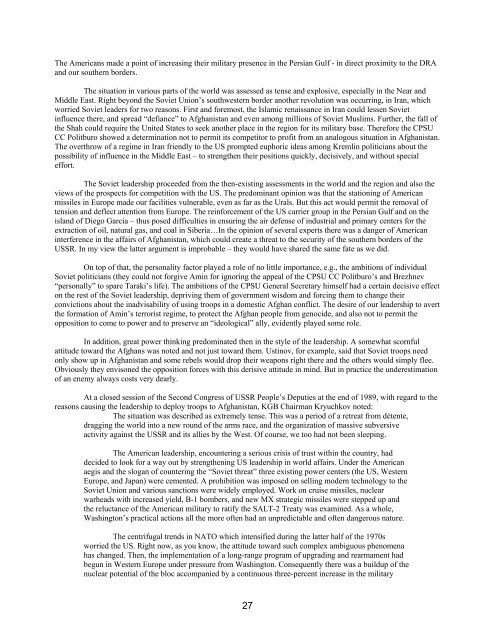Aleksandr Antonovich Lyakhovskiy Working Paper pp - Woodrow ...
Aleksandr Antonovich Lyakhovskiy Working Paper pp - Woodrow ...
Aleksandr Antonovich Lyakhovskiy Working Paper pp - Woodrow ...
You also want an ePaper? Increase the reach of your titles
YUMPU automatically turns print PDFs into web optimized ePapers that Google loves.
The Americans made a point of increasing their military presence in the Persian Gulf - in direct proximity to the DRA<br />
and our southern borders.<br />
The situation in various parts of the world was assessed as tense and explosive, especially in the Near and<br />
Middle East. Right beyond the Soviet Union’s southwestern border another revolution was occurring, in Iran, which<br />
worried Soviet leaders for two reasons. First and foremost, the Islamic renaissance in Iran could lessen Soviet<br />
influence there, and spread “defiance” to Afghanistan and even among millions of Soviet Muslims. Further, the fall of<br />
the Shah could require the United States to seek another place in the region for its military base. Therefore the CPSU<br />
CC Politburo showed a determination not to permit its competitor to profit from an analogous situation in Afghanistan.<br />
The overthrow of a regime in Iran friendly to the US prompted euphoric ideas among Kremlin politicians about the<br />
possibility of influence in the Middle East – to strengthen their positions quickly, decisively, and without special<br />
effort.<br />
The Soviet leadership proceeded from the then-existing assessments in the world and the region and also the<br />
views of the prospects for competition with the US. The predominant opinion was that the stationing of American<br />
missiles in Europe made our facilities vulnerable, even as far as the Urals. But this act would permit the removal of<br />
tension and deflect attention from Europe. The reinforcement of the US carrier group in the Persian Gulf and on the<br />
island of Diego Garcia – thus posed difficulties in ensuring the air defense of industrial and primary centers for the<br />
extraction of oil, natural gas, and coal in Siberia…In the opinion of several experts there was a danger of American<br />
interference in the affairs of Afghanistan, which could create a threat to the security of the southern borders of the<br />
USSR. In my view the latter argument is improbable – they would have shared the same fate as we did.<br />
On top of that, the personality factor played a role of no little importance, e.g., the ambitions of individual<br />
Soviet politicians (they could not forgive Amin for ignoring the a<strong>pp</strong>eal of the CPSU CC Politburo’s and Brezhnev<br />
“personally” to spare Taraki’s life). The ambitions of the CPSU General Secretary himself had a certain decisive effect<br />
on the rest of the Soviet leadership, depriving them of government wisdom and forcing them to change their<br />
convictions about the inadvisability of using troops in a domestic Afghan conflict. The desire of our leadership to avert<br />
the formation of Amin’s terrorist regime, to protect the Afghan people from genocide, and also not to permit the<br />
o<strong>pp</strong>osition to come to power and to preserve an “ideological” ally, evidently played some role.<br />
In addition, great power thinking predominated then in the style of the leadership. A somewhat scornful<br />
attitude toward the Afghans was noted and not just toward them. Ustinov, for example, said that Soviet troops need<br />
only show up in Afghanistan and some rebels would drop their weapons right there and the others would simply flee.<br />
Obviously they envisoned the o<strong>pp</strong>osition forces with this derisive attitude in mind. But in practice the underestimation<br />
of an enemy always costs very dearly.<br />
At a closed session of the Second Congress of USSR People’s Deputies at the end of 1989, with regard to the<br />
reasons causing the leadership to deploy troops to Afghanistan, KGB Chairman Kryuchkov noted:<br />
The situation was described as extremely tense. This was a period of a retreat from détente,<br />
dragging the world into a new round of the arms race, and the organization of massive subversive<br />
activity against the USSR and its allies by the West. Of course, we too had not been sleeping.<br />
The American leadership, encountering a serious crisis of trust within the country, had<br />
decided to look for a way out by strengthening US leadership in world affairs. Under the American<br />
aegis and the slogan of countering the “Soviet threat” three existing power centers (the US, Western<br />
Europe, and Japan) were cemented. A prohibition was imposed on selling modern technology to the<br />
Soviet Union and various sanctions were widely employed. Work on cruise missiles, nuclear<br />
warheads with increased yield, B-1 bombers, and new MX strategic missiles were ste<strong>pp</strong>ed up and<br />
the reluctance of the American military to ratify the SALT-2 Treaty was examined. As a whole,<br />
Washington’s practical actions all the more often had an unpredictable and often dangerous nature.<br />
The centrifugal trends in NATO which intensified during the latter half of the 1970s<br />
worried the US. Right now, as you know, the attitude toward such complex ambiguous phenomena<br />
has changed. Then, the implementation of a long-range program of upgrading and rearmament had<br />
begun in Western Europe under pressure from Washington. Consequently there was a buildup of the<br />
nuclear potential of the bloc accompanied by a continuous three-percent increase in the military<br />
27

















